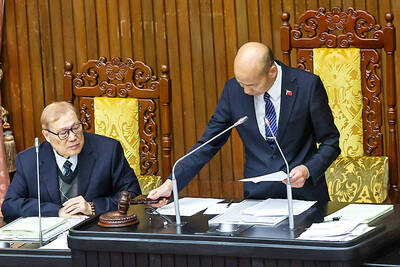Taiwan should fortify its ties with US Democrats and Republicans at the federal and state levels, as divisions in the US would likely persist after the winner of the US presidential election has been confirmed, experts said yesterday.
Although vote-counting has not yet been finalized, as of press time last night, the narrow margin between the US presidential candidates would affect the “mandate” of the new administration, National Taiwan University political science professor Simon Chang (張登及) told a forum in Taipei.
The forum, organized by the Association of Strategic Foresight, focused on the future of ties among Taipei, Washington and Beijing at a time when Taiwanese are anxious about the election result.

Photo: CNA
Even if former US vice president Joe Biden, the Democratic candidate, wins, he would be embroiled in lawsuits that US President Donald Trump, a Republican, has vowed to launch, Chang said.
If the Republicans continue to hold a majority in the US Senate under a Biden presidency, a rift between it and the White House would be expected, affecting budgets and the appointment of key personnel, he said.
With Trump’s odds of being re-elected shrinking, he might pursue a more radical policy to rally support, Chang said, adding that the US’ social discord would last for quite a while no matter the election’s outcome.
The possibility of Beijing using force against Taiwan during the period is low, but China would maintain pressure in the Taiwan Strait and continue to “tactically harass” Taiwan to prevent any risky scenarios caused by the US election’s uncertainty, he said.
Chang also addressed Beijing’s relations with Tokyo, Seoul, and nations in the South China Sea and Europe.
As Chinese Minister of Foreign Affairs Wang Yi (王毅) has scheduled a visit to Japan, Taiwan should watch interactions between Wang and Japanese Prime Minister Yoshihide Suga, who assumed the post in September, Chang said.
The developments of China-Europe relations are also worth attention, after an EU-China leaders’ meeting in September did not culminate in signed agreements, he said.
Much uncertainty overshadows Washington, as Trump, if re-elected, might employ new personnel in his second term, while Biden would need time to clarify his foreign policy, said association president Li Da-jung (李大中), who is also associate professor at Tamkang University’s Graduate Institute of International Affairs and Strategic Studies.
Although Washington has pursued many policies considered beneficial for Taiwan during the Trump presidency, further observation is needed to see to what extent they are carried out, he said.
Asked if President Tsai Ing-wen’s (蔡英文) administration had shown a preference for Trump over Biden, Li said that a Ministry of Foreign Affairs video montage compiling congratulatory messages from US dignitaries for Tsai’s second inauguration in May unduly neglected US Democrats, as reported by the Washington Post.
The government should have been more careful and not left the impression that it was favoring either party, he added.
Asked how the government might improve relations with US Democrats, Li said that it should continue to solicit bipartisan support from the US to boost Taiwan’s international participation and Taiwan-US military cooperation.
Taiwan should also attempt to increase its connections with state governments, Li added.
The structures of Beijing-Washington-Taipei ties would not undergo significant changes, although a Biden administration might take milder approaches toward cross-strait issues, National Cheng Kung University professor Bernard Chou (周志杰) said.
However, Taiwanese officials should learn a lesson from the division in the US and stop manipulating populism for their own political benefit, he added.

DEFENDING DEMOCRACY: Taiwan shares the same values as those that fought in WWII, and nations must unite to halt the expansion of a new authoritarian bloc, Lai said The government yesterday held a commemoration ceremony for Victory in Europe (V-E) Day, joining the rest of the world for the first time to mark the anniversary of the end of World War II in Europe. Taiwan honoring V-E Day signifies “our growing connections with the international community,” President William Lai (賴清德) said at a reception in Taipei on the 80th anniversary of V-E Day. One of the major lessons of World War II is that “authoritarianism and aggression lead only to slaughter, tragedy and greater inequality,” Lai said. Even more importantly, the war also taught people that “those who cherish peace cannot

STEADFAST FRIEND: The bills encourage increased Taiwan-US engagement and address China’s distortion of UN Resolution 2758 to isolate Taiwan internationally The Presidential Office yesterday thanked the US House of Representatives for unanimously passing two Taiwan-related bills highlighting its solid support for Taiwan’s democracy and global participation, and for deepening bilateral relations. One of the bills, the Taiwan Assurance Implementation Act, requires the US Department of State to periodically review its guidelines for engagement with Taiwan, and report to the US Congress on the guidelines and plans to lift self-imposed limitations on US-Taiwan engagement. The other bill is the Taiwan International Solidarity Act, which clarifies that UN Resolution 2758 does not address the issue of the representation of Taiwan or its people in

The Philippines yesterday criticized a “high-risk” maneuver by a Chinese vessel near the disputed Scarborough Shoal (Huangyan Island, 黃岩島) in a rare incident involving warships from the two navies. The Scarborough Shoal — a triangular chain of reefs and rocks in the contested South China Sea — has been a flash point between the countries since China seized it from the Philippines in 2012. Taiwan also claims the shoal. Monday’s encounter took place approximately 11.8 nautical miles (22km) southeast” of the Scarborough Shoal, the Philippine military said, during ongoing US-Philippine military exercises that Beijing has criticized as destabilizing. “The Chinese frigate BN 554 was

LEISURE: The new law adds Confucius’ birthday, the anniversary of the Battle of Guningtou, Constitution Day and Little New Year as national holidays The Legislative Yuan yesterday passed new legislation adding four national holidays and making Workers’ Day a national holiday for all sectors. The Chinese Nationalist Party (KMT) and the Taiwan People’s Party used their combined majority in the legislature to push the jointly proposed draft through its third and final reading. This new law supersedes the existing regulations for the implementation of memorial days and state holidays, which are administered by the Ministry of the Interior. The new law recognizes Confucius’ birthday on Sept. 28, the anniversary of the Battle of Guningtou on Oct. 25, Constitution Day on Dec. 25 and “Little New Year,”